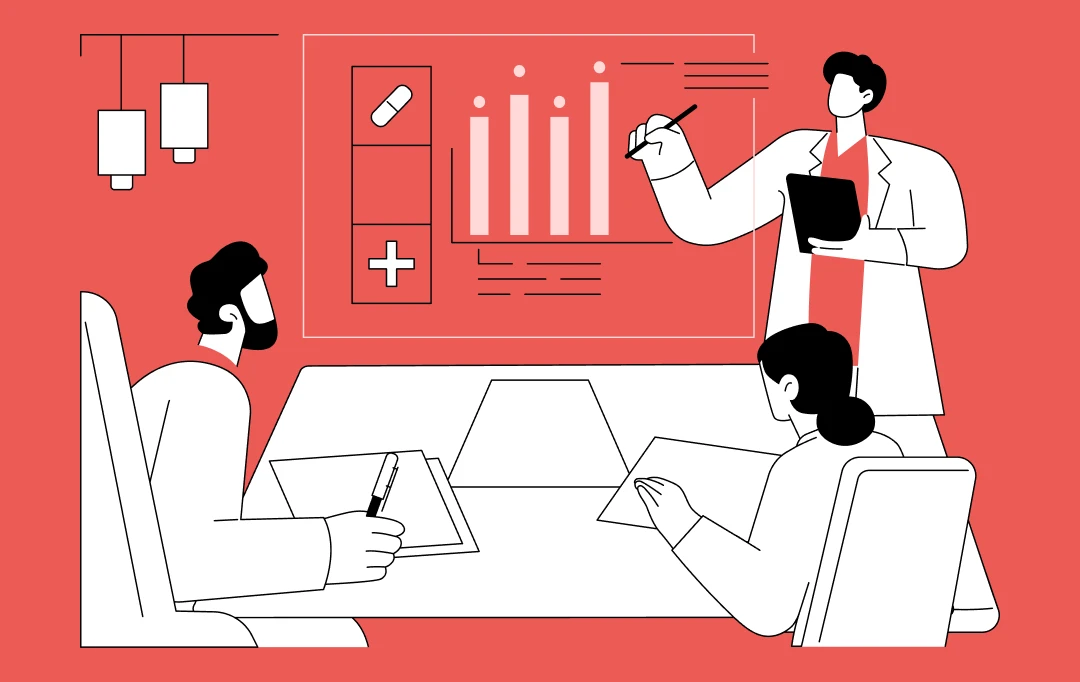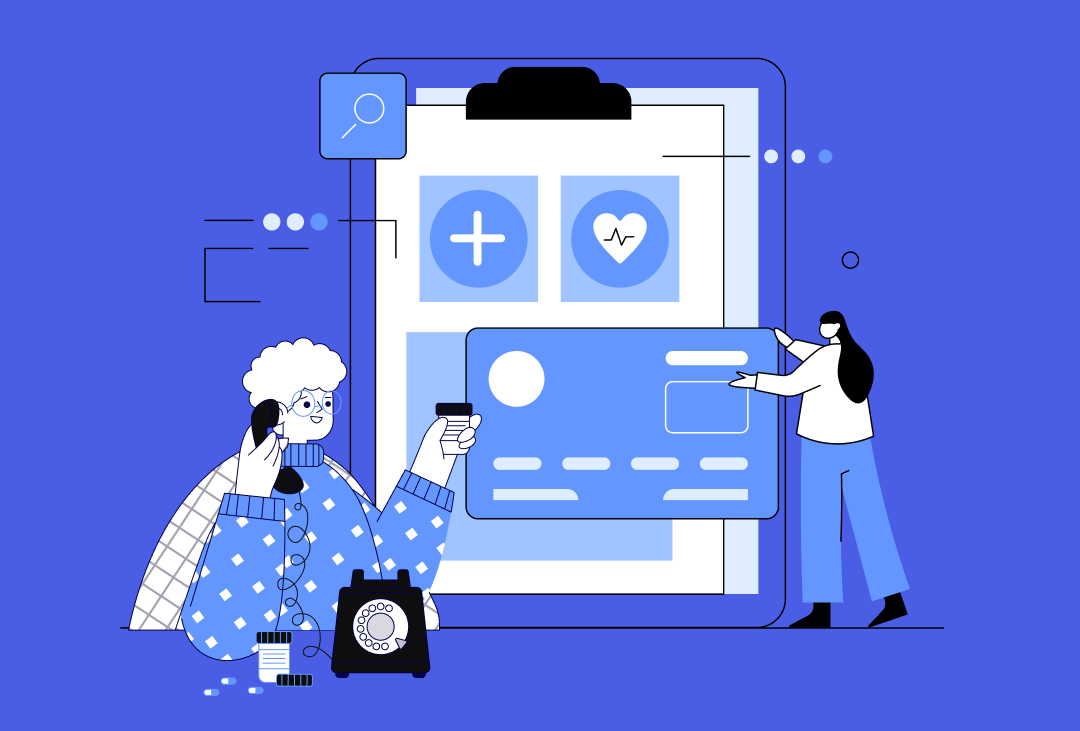- Understanding the Need for Custom Medical Billing Software
- Must-Have Features in a Custom Medical Billing Software
- Patient Registration and Management
- Electronic Health Records (EHR) Integration
- Claim Management
- Coding and Auditing
- Payment Gateways
- Reporting and Analytics
- User-friendly Dashboard
- Multi-user Access Control
- Automated Reminders and Notifications
- Compliance and Security Measures
- Factors Influencing Development Costs of Medical Billing Software
- Software Features and Functionality
- Development Team and Expertise
- Integration Requirements
- Compliance and Security
- Tips for Optimizing the Cost of developing medical billing software
- Clear Project Requirements
- Cost-effective Strategies
- Prioritize Features
- Outsourcing
- Open-Source Tools
- App Development Process of a Custom Medical Billing Software
- Why Should You Choose Appinventiv to Build a Custom Medical Billing Software
- FAQs
The worldwide healthcare industry is expected to hit a valuation of around $665.37 billion by 2028. Simultaneously, healthcare spending in the United States alone is predicted to soar to a staggering $6.2 trillion within the same timeframe. This data underscores the pressing need for cost-efficient, effective medical billing solutions, irrespective of the size or specialty of your healthcare facility.
The cost to build medical billing software is a crucial consideration for healthcare providers looking to streamline their financial operations. This blog aims to demystify the factors that contribute to the medical billing software development cost. From initial planning to software deployment, we’ll delve into the various elements that affect the total expense.
Whether you’re a small clinic or a multi-specialty hospital, understanding these costs will help you make an informed decision. Read on to explore what goes into the financial planning of creating a custom medical billing solution the budget for which is usually between $30,000 and $300,000.
Understanding the Need for Custom Medical Billing Software
The healthcare industry often grapples with complexities that are not encountered in other sectors. While off-the-shelf solutions may appear economical, they frequently lack the specific functionalities that healthcare organizations require.
Generic software solutions might not comply with industry standards, which is a critical aspect of medical billing. This is where medical billing software comes into play. And any discussion about a medical billing software wouldnt be ccomplete without discussing the cost to build medical billing software.
Investing in custom solutions is often essential for meeting the unique requirements of healthcare organizations. Not only can customized solutions adapt to specific workflows, but they also ensure that the organization is compliant with regulatory standards.
Moreover, the cost of medical billing software development should be viewed as a long-term investment. With custom software, updates and changes can be made quickly without having to wait for a new version of an off-the-shelf product.
The types of medical software can vary, but a customized solution allows you to pick and choose functionalities that align precisely with your organization’s needs, thus making the expense a justified one.
Must-Have Features in a Custom Medical Billing Software
In the journey of understanding how much it costs to build medical billing software, one of the essential components to consider is the feature set. The features not only define the utility of the software but also directly impact the cost of medical billing software development. In this section, we will discuss some must-have medical billing software features that are crucial for the smooth functioning of healthcare software.

Patient Registration and Management
A cornerstone for any medical billing software is the Patient Registration and Management feature. Effective management of patient data is not just an operational requirement; it’s a necessity for ensuring that billing processes are error-free. This feature will add to the cost to build medical billing software, but consider it a crucial investment.
Electronic Health Records (EHR) Integration
Next on the list is Electronic Health Records (EHR) Integration. This feature allows for seamless communication between clinical and financial data. The lack of this feature can result in disorganized workflows and billing errors. In terms of medical billing software benefits, EHR Integration offers unparalleled operational cohesion, making it easier to manage both healthcare and billing metrics.
Claim Management
Claim Management is yet another feature that stands high on the list of must-haves. This tool automates the claim creation, submission, and tracking process, significantly reducing manual labor and the likelihood of errors. The upfront cost of medical billing software development may seem steep with this feature, but the long-term medical billing software benefits in saved time and reduced errors are substantial.
Coding and Auditing
The Coding and Auditing feature in medical billing software is a system that ensures that medical procedures are coded accurately. Accurate coding is vital for correct billing and compliance with legal regulations. This feature will undoubtedly add to the cost of medical billing software development, but the returns in the form of reduced compliance risks are invaluable.
Payment Gateways
One of the most vital features is the inclusion of secure Payment Gateways. In today’s digital era, offering multiple, secure payment options is not just a convenience; it’s a necessity. Integrating a reliable payment gateway can significantly enhance the customer experience, thus adding to the medical billing software benefits. However, it’s worth mentioning that adding secure and HIPAA-compliant payment gateways will influence the medical billing software development cost.
Reporting and Analytics
Reporting and Analytics are crucial for assessing the financial health of healthcare institutions. These features enable the organization to track revenue, spot billing errors, and analyze various performance metrics. While developing these features can add to the expense, the medical billing software benefits, such as data-driven decision-making and revenue optimization, are worth the investment.
User-friendly Dashboard
A User-friendly Dashboard is more than just an aesthetic requirement. It’s the operational center of your custom medical billing software. The ease with which users can navigate through different functionalities can dramatically affect workflow efficiency. To develop medical billing software with an intuitive dashboard, additional design and user experience testing are usually required, affecting the overall budget.
Multi-user Access Control
Healthcare organizations often have multiple staff members accessing the billing software for different tasks. Therefore, Multi-user Access Control is essential for maintaining data integrity and role-based access. It ensures that only authorized personnel can make changes to sensitive data. This feature can be tricky to implement but serves as an essential component when you develop medical billing software.
Automated Reminders and Notifications
Automated Reminders and Notifications are non-negotiable in today’s fast-paced medical environment. These alerts can be set through automated billing software for various tasks, such as reminding staff about pending bills or notifying them about claim statuses. The convenience and operational efficiency these features add to your custom medical billing software can’t be understated.
Compliance and Security Measures
Last but not least, Compliance and Security Measures are crucial for protecting sensitive patient data and avoiding legal ramifications. Implementing high-level security protocols and staying compliant with regulations like HIPAA or GDPR are not just optional but mandatory. These features play a significant role in determining the medical billing software development cost.
These medical billing software features not only significantly contribute to effective and efficient financial management in healthcare but also add varying amounts to the overall cost to build medical billing software. Each of these features brings its own set of medical billing software benefits, ranging from operational efficiency and error reduction to compliance and financial optimization.
Therefore, when considering the budget for creating a custom medical billing software, one should not only factor in the initial development costs but also the long-term benefits these features will bring to your healthcare organization.
Factors Influencing Development Costs of Medical Billing Software
When it comes to understanding how much it costs to create medical billing software, several variables play a crucial role in determining the final budget. In this section, we’ll break down the key factors that influence the medical billing software development cost and what each entails.

Software Features and Functionality
The first factor you need to consider when calculating the cost to build medical billing software is Software Features and Functionality. The features you decide to integrate into your platform will significantly sway the budget. For example, let’s consider real-time analytics.
If you’re a healthcare provider with multiple locations, having a real-time analytics feature can help centralize billing data, providing instant insights into billing operations. This capability is exceptionally beneficial but also adds to the development cost.
Similarly, integration with Electronic Health Records (EHR) is another feature that can elevate your medical billing management software to the next level. A use case here would be an integrated care facility where various healthcare services, from primary care to specialized treatment, are provided. A seamless EHR integration would facilitate consolidated billing, removing the need for separate billing systems for each department, thereby increasing overall efficiency.
Your choice between web-based medical billing software and cloud-based medical billing software also has cost implications. For instance, if you are a small clinic with limited operational needs, a web-based medical billing software might suffice and come with a smaller initial investment.
On the other hand, a multi-location healthcare provider would benefit more from cloud-based medical billing software, which offers scalability and remote accessibility, albeit at a potentially higher initial expense. However, in the long run, cloud-based solutions can prove more cost-effective due to lower maintenance and upgrade costs.
Development Team and Expertise
The next critical element that impacts the cost of medical billing software development is the Development Team and Expertise. The skill set and experience of your development team directly correlate with the quality of the medical billing software you will produce.
In simpler terms, a more specialized team can craft a more advanced, efficient, and user-friendly system. However, this caliber of expertise generally comes with higher price tags.
Let’s consider a use case. Imagine you run a large, multi-specialty hospital with complex billing needs, including various departments, specialties, and perhaps even telemedicine services. In such a situation, hiring a top-notch development team that understands the nuances of healthcare billing is critical.
Opting for a less experienced team to save costs may result in software that lacks essential features or fails to meet compliance standards, ultimately costing more in the long run due to required revisions or even legal challenges.
Geographically, the location of your development team will also have a significant effect on the cost of medical billing software development. Developers based in regions like North America usually have higher rates compared to those in countries in South Asia or Eastern Europe.
For instance, if you’re a startup in the United States and are budget-conscious, you might consider outsourcing some development aspects to overseas experts, although this might introduce challenges like time-zone differences and potential communication barriers.
Integration Requirements
Integration Requirements stand as another pivotal factor influencing the medical billing software development cost. The necessity to integrate your medical billing software with existing systems—be it Electronic Health Records (EHR), Customer Relationship Management (CRM), or accounting software—adds layers of complexity to the development process.
For instance, consider a use case involving a mid-sized healthcare facility that already utilizes a CRM system to manage patient relationships and accounting software for financial transactions. If the new medical billing software isn’t compatible with these existing systems, the facility would have to allocate extra manpower to manually update each platform. On the other hand, a well-integrated system would automate this, saving both time and resources in the long run. But this convenience comes at a cost. Each integration generally requires custom coding and specialized solutions, which escalate the medical billing software development cost.
The complexity deepens if you opt for cloud-based medical billing software. In such a scenario, seamless integration becomes even more challenging due to the additional layers of security protocols and data encryption standards that cloud-based solutions generally come with. This invariably requires specialized skill sets and perhaps even the involvement of third-party services, thereby further impacting the overall development cost.
Understanding these complexities and planning for them in advance can help you make a more informed decision regarding the medical billing software development cost and ensure that the end product aligns perfectly with your operational needs.
Compliance and Security
Lastly, Compliance and Security are vital elements that significantly influence the cost of medical billing software development. Medical billing involves the collection and storage of highly sensitive patient data, necessitating strict adherence to various regulatory frameworks like HIPAA (Health Insurance Portability and Accountability Act) in the United States or GDPR (General Data Protection Regulation) in the European Union.
Consider a use case where a healthcare provider has multiple branches across different jurisdictions. Each jurisdiction might have its own set of data protection laws and compliance standards, all of which need to be meticulously incorporated into the medical billing software. Failure to do so could result in substantial fines, legal issues, and loss of reputation.
To achieve compliance, high-level security measures such as encryption, multi-factor authentication, and regular security audits must be integrated into the software. For example, when a patient books an appointment or pays a bill online, encryption algorithms secure the transaction details. Multi-factor authentication can be used to verify the identity of users accessing sensitive patient data, thereby providing an extra layer of security.
These security protocols are non-negotiable but increase the overall cost of medical billing software development. Though these additions may seem like they inflate the budget, they are crucial for risk mitigation and maintaining data integrity. These aren’t just optional add-ons; they are fundamental necessities to protect both the healthcare provider and the patients.
Taking all these factors into account along with the nature and number of the features that you integrate into your custom medical billing software, the estimated cost for developing custom medical billing software generally ranges between $30,000 and $300,000.
Tips for Optimizing the Cost of developing medical billing software
Navigating the financial aspects of software development can be challenging, but with strategic planning and clear guidelines, you can optimize the costs as you build your custom medical billing software. Here are some key tips to keep your expenses in check.
Clear Project Requirements
Being explicit about what you need is crucial to control the cost to build medical billing software. For example, if a dental practice management software initially only has billing capabilities….but later decides to integrate with a scheduling system, costs will inevitably rise. Avoid this by setting clear, detailed requirements from the outset.
Cost-effective Strategies
Adopting Agile methodologies allows for incremental development, helping to manage expenses. Each sprint gives you an opportunity to evaluate features and costs, allowing for adjustments as needed, which is particularly beneficial when you create medical billing software.
Prioritize Features
Focus on must-have features first to keep the initial development costs low. You can always add other features in subsequent phases based on user feedback and necessity.
Outsourcing
Consider hiring development teams from regions where labor costs are lower. This can significantly reduce the overall costs, but keep in mind the potential trade-offs in terms of time zones and language barriers.
Open-Source Tools
Utilizing open-source software components can also lower costs, but be sure to evaluate compatibility and compliance issues to avoid expensive adjustments later on.
By incorporating these strategies, you gain more control over costs and can make more informed decisions throughout the development process.
App Development Process of a Custom Medical Billing Software
Understanding the key stages involved in the development of custom medical billing software is crucial for estimating the overall cost to build medical billing software. Here’s a simplified breakdown:
Requirement Analysis
The initial phase of the medical billing software development process focuses on clearly defining the healthcare facility’s needs. For instance, a specialized cancer treatment center may require unique billing codes, which could escalate costs.
Design and Architecture
The structure and user interface of the software are planned at this stage. The level of complexity here will influence overall costs.
Development
At this core stage of the medical billing software development process, specific features are coded and integrated. More advanced features, like integration with existing EHR systems, can substantially impact the budget.
Testing
Verifying that the software meets all functional and compliance requirements is vital but can add to the overall cost, especially if specialized security audits are needed.
Knowing these phases helps healthcare providers plan better and make more informed financial decisions.
Why Should You Choose Appinventiv to Build a Custom Medical Billing Software
Choosing Appinventiv for your project offers a strategic advantage when it comes to managing the cost to build medical billing software. With a track record of delivering efficient and reliable solutions, Appinventiv, being a reputed healthcare software development company, understands how to create medical billing software that meets the unique needs of healthcare providers. Our team of experts focuses on incorporating essential features and security measures while adhering to industry compliance standards. This approach not only optimizes costs but also ensures a quick market launch. Trusting Appinventiv means investing in quality, security, and cost-effective medical billing solutions.
FAQs
Q. How much does it cost to build medical billing software?
A. The cost to develop a custom medical billing software can vary widely based on the features, complexity, and technology stack involved. Typically, the estimated cost for such a project can range between $30,000 to $300,000. Factors influencing this cost include the development team’s expertise, integration requirements, compliance and security measures, and the software’s overall functionality.
Q. How long does it take to build medical billing software?
A. Generally, a simpler version with basic features may take around 3-6 months to develop, while a more complex system with advanced functionalities and integrations could take upwards of 12-18 months. The timeline can also be affected by iterative testing, debugging, and any necessary adaptations to meet compliance standards.
Q. Can I opt for a phased development to manage costs?
A. Yes, phased development can help in spreading the costs over time. However, this approach may extend the total development time and could incur additional costs for version updates and feature integrations in later phases.



Why Telehealth Security is Non-Negotiable for Patient Trust and How to Achieve It
Key takeaways: Telehealth security is crucial for patient trust and the continued adoption of digital healthcare services. The rising tide of cyber threats, from ransomware to inadequate authentication, poses significant risks to patient data and provider reputation. Implementing robust security measures like end-to-end encryption, multi-factor authentication, and regular audits is non-negotiable. Compliance with regulations like…

10 Ways Healthcare Providers Are Using Patient Analytics to Enhance Care Plans and Optimize Outcomes
Imagine a world where doctors don’t just react to health crises, but predict and prevent them before they happen. This is the reality with patient analytics for healthcare providers. The healthcare industry is no longer limited to treating symptoms—it’s now about understanding patterns, making smarter decisions, and delivering care that’s truly personalized. And it’s not…

Exploring the Role of Personalization in Healthcare through Technology
Key takeaways: Personalization in healthcare transforms patient care from generic, population-based treatments to individualized approaches tailored to each patient's unique needs. Advanced technologies like AI, IoMT, and genomics are the core enablers for tailoring medical treatments. Personalization drives significant benefits, including improved patient outcomes, higher engagement, and reduced costs. The future of healthcare is hyper-individualized,…

















